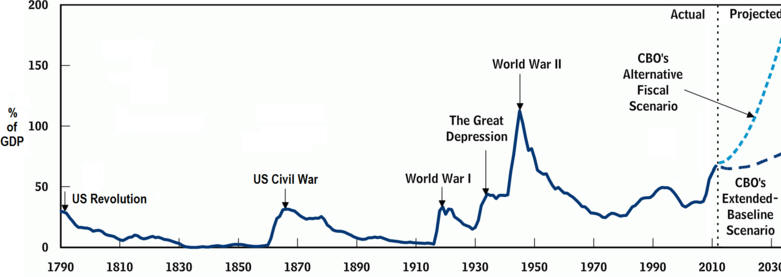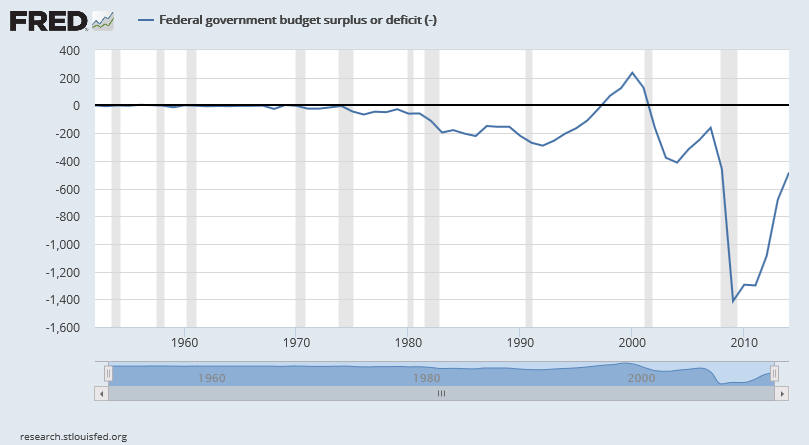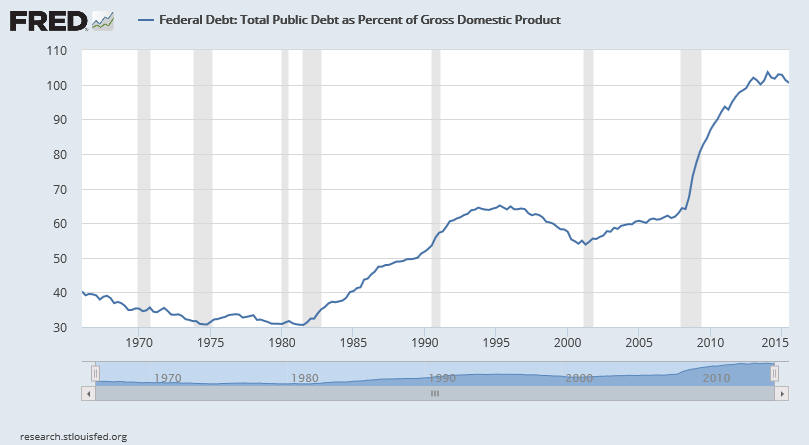ECON 369
Outline Twelve:
Alternative Means of Financing Government Expenditures
Sources:
Various
(see citations in the text).
There are typically three ways of financing government spending:
taxes, debt, and money.
Some governments also charge for the use of
certain services as we have discussed. For example, user fees for national
parks, toll roads, and charging for public transportation are also used.
And governments can sell off assets, e.g.,
buildings, land, bombers, etc.
Can you think of others?
Common
Wisdom: If the economy is stronger than expected, federal government
revenues increase and expenditures decrease. If the economy is weaker than
expected, federal government revenues decrease and expenditures increase.
Financing tends to be vastly dominated by taxes,
bonds, and money. We have already discussed taxes. So now let's
discuss debt and money.
The Chart Below
shows the pattern of US Federal debt since 1790 as a percent of GDP. The
government dramatically increased the stock of debt to finance its wars. This
was usually followed by a long period of declining debt as the US paid off the
debt incurred during the war. It should be noted that
the chart does not include intergovernmental bonds, i.e., bonds transacted
between agencies in the government. One of the main sources of these bonds is
the social security trust fund, which began accumulating in the early 1980s.

Let's review some terms:
How does the government go into debt?
Government Debt vs. Private Debt (private businesses engage in both equity
financing and debt financing - know the difference) -- the government simply
goes into debt to pay for its expenditures.
Treasury
Bonds or Bills:
Balanced
Budget:
Budget Surplus:
Budget Deficit:
Budget
Deficit: (Billions of Dollars)
https://research.stlouisfed.org/fred2/series/M318501A027NBEA

Federal or
National Debt
- the total amount borrowed from investors to finance deficit spending by the
federal government. The accumulated borrowing from all past deficits minus debt
that has been retired with past surpluses.
Gross
National Debt - Value of all outstanding government securities of any
maturity held by private investors or in government accounts.
Net
National Debt - subtract out the debt held by the federal government
(intra-governmental holdings)
The Debt Clock
Debt as % of GDP
https://research.stlouisfed.org/fred2/series/GFDEGDQ188S

Who holds the debt?
The
Treasury Bulletin, available online from the Financial
Management Service categorizes ownership of U.S. Government
securities by types of investors.The Debt Held by the Public is all
federal debt held by individuals, corporations, state or local
governments, foreign governments, and other entities outside the
United States Government less
Federal Financing Bank securities. Types of securities held by
the public include, but are not limited to,
Treasury Bills, Notes, Bonds, TIPS, United States Savings Bonds,
and
State and Local Government Series securities.
Here's a picture of it:
https://www.nationalpriorities.org/campaigns/us-federal-debt-who/ )
There are two basic categories of debt owners: 1) the
public, which includes foreign investors and domestic investors
and, 2) federal accounts, also known as "intragovernmental
holdings.
Debt Held by the Public: Domestic Investors
Public debt is also held domestically. Domestic
private investors - which includes regular American citizens as well as
institutions like private banks.
The U.S. Federal Reserve Bank buys and sells
Treasury bonds as part of its work to control the money supply and set
(manipulate)
interest rates in the U.S. economy, so they hold some of the debt (about 13%).
Finally, U.S. state and local governments have
also lent money to the federal government.
Debt Held by the Public: Foreign Investors
About 34 percent of the U.S. debt is held
internationally by foreign investors (i.e. foreign governments,
foreign institutions, and individual people in foreign countries)
who buy U.S. Treasury bonds as investments.
Debt Held by Federal Accounts (intragovernmental
holdings)
Debt held by federal accounts is not considered
public debt - it is the amount of money that the Treasury has borrowed
from itself. That may sound funny, but it means that the Treasury
borrows surplus money from one trust fund and gives it to another trust
fund. For example, the Treasury might borrow money from Social
Security to finance current government spending in another area. At a
later date, the government must pay that borrowed money back.
(Note: The Federal Reserve is not
counted as "debt held by federal accounts" because the Federal Reserve
is considered independent of the federal government - well at least its
budget is!
What
about New Money
U. S.
Treasury vs. The FED (central bank of the U.S.):
Monetizing the Debt and Inflation:
The Economic Analysis

Probably
the most prolific economist on the topic of government debt:
James Buchanan
(all of the following quotations are by Buchanan). Beginning with his Public
Principles of Public Debt, published in 1958.
Buchanan says
(from your reading):
1. The primary real burden of a public debt is shifted to
future generations.
2. The analogy between public debt and private debt is fundamentally correct.
3. The external debt and the internal debt are fundamentally equivalent.
1. Discussion
of the problem of the burden on future
generations. Moral dimension to the debt. Buchanan disagreed with
Keynesian economist Abba Lerner, who stated: the "national debt is not a burden on posterity
because if posterity pays the debt it will be paying it to the same posterity
that will be alive at the time when the payment is made." In other words, the
same group of people will be paying interest on the debt -- to themselves (those
that hold the bonds). Taxed one day, receive interest the next. So
the "burden" of the debt falls on those who own the government bonds.
So quotation
from reading: "perhaps the best clue provided in a statement from Brownlee
and Allen: 'The public project is paid for while it is being constructed
in the sense that other alternative uses for these resources must be sacrificed
during this period.'"
As Buchanan
states -- this is obviously true. But, "the mere shifting of resources
from private to public employment does not carry with it any implication of
sacrifice or payment."
Buchanan's argument:
Bob buys a government bond (his choice) because in
his mind this is a good exchange -- he lends the money today in order to earn
interest in the future. He benefits from this exchange. He does not
undertake the burden or sacrifice of a given public project even if the money he
lends is used for that particular public project.
Bob does give up a current command over his
resources -- but it is his choice to do so -- he freely does this in order to
gain the interest.
Putting aside the effects of the public spending --
no other individuals in the economy are affected at this time.
The problem is that the argument is only
concerned with macro-economic variables and not with individual human beings!!
We must break down the economy into individuals (or families) in order to
understand where the burden of deficit spending falls.
Buchanan: "The public project is
purchased, and paid for, by those individuals who sill be forced to give up
resources in the future . . . ." "The burden must rest, therefore,
on the taxpayer in future time periods and on no one else. He now must
reduce his real income to transfer funds to the bondholder, and he has no
productive asset in the form of a public project to offset his genuine
sacrifice."
If the public expenditure was wasteful (or the
benefit from it only gained by individuals at the time of the public
expenditure) then there is no further analysis. However:
"If the debt is created for productive public
expenditure, the benefits to the future taxpayer must, of course, be compared
with the burden so that, on balance he may suffer a net benefit or a net
burden."
In other words, if the expenditure was made on
something that might still be around to benefit future taxpayers -- then that
has to be considered. But again, this should be looked at on an individual
basis. If the money was spent on a highway in Colorado - and a federal
taxpayer in New York never visits Colorado -- he has no gain!
So he attacked the
notion that "we owe it to ourselves." His use of subjective cost
concepts was important here in demonstrating that we do not owe the debt to
ourselves, but that the burden is shifted to future generations.
Individual subjective cost analysis vs.
aggregate "welfare" analysis.
So are Deficits OK -- or do they really do harm to the economy?
Remember that
is was Keynes, in the 1930s, who suggested that deficits be used as a policy
tool (not just to finance war or other abnormal spending).
Keynesians
more typically today:
On the perpetual question of whether budget deficits matter and if so why, the
Neo-Keynesian answer distinguishes between
cyclical and structural deficits.
Structural
deficits
might
matter because they decrease savings, crowd out private domestic investment and
reduce future national income (explained below).
But the
automatic tendency of tax collections to fall and government transfers to rise
during an economic downturn, creating larger deficits in the Federal budget,
serves as a vital economic shock absorber that cushions private spending and
mitigates fluctuations. Remember, to a Keynesian, spending (aggregated demand)
is what drives an economy. So cyclical deficits are OK -- fiscal policy to
manipulate the economy is OK.
Buchanan's
Response
(and that of others) was to bring back the Classical Model of Crowding Out.
To him (and others) why the government is deficit spending doesn’t matter:
Crowding
Out
When the
government borrows, it enters the loanable funds market as a borrower (demander
of savings). This increase in demand drives up interest rates -- making
borrowing by private investors more expensive -- thereby decreasing productive
private investment.
Government
spending is not as productive as private investment - hence there is a decrease
in the overall pie!
What are Keynesians saying today about "crowding
out?"
Again -- if deficits are structural, than even
Keynesian might agree that large deficits might harm economic growth.
However, today they are saying that due to the large amount of excess reserves
in banks (due to expansive monetary policy by the FED), there is no crowding
out. In other words -- the FED has increased the money supply such that
the supply of loanable funds (although NOT from real savings) -- are high enough
to offset any increase in the demand for loanable funds - thus the interest rate
has not increased.
Plus -- if the deficits (and the debt) are an issue
-- the solution is to tax the rich. Why? Because the rich will pay
the taxes out of savings, not consumption -- therefore, aggregate demand will
not suffer.
What About Savings?
The argument then centered on (and still does
in some circles) the Ricardian Equivalence Theorem: farsighted,
rational taxpayers would be indifferent to the timing of taxes. That is, they
would treat deficits as equivalent to higher future taxes and surpluses as
equivalent to lower future taxes. Therefore, with deficits, taxpayers would
save now in order to pay the future taxes -- bringing interest rates back down.
Deficits would, therefore, not matter with respect to economic growth, etc.
David Ricardo
proposed this in the 1800's and then himself identified several reasons why this
"equivalence" may fail:

a. How much
should taxpayer's save now for the future?
b. Will
taxpayers really anticipate the higher future taxes?
c. Some
taxpayers may think the future taxes will be levied after they are dead, so why
save now?
d. Some
taxpayers may think the future taxes will come after they are retired -- so they
will fall on the next generation of workers - so why not let them deal with it?
Let the next generation pick up the tab (i.e., tax)!
Does Ricardian Equivalence actually hold in the world as it is? That's an
empirical question, and there is an ongoing debate among economists over which
side's evidence is weaker.
2. With
respect to the analogy between private debt
and public debt - Again - "When an internal debt is created, resources for
public use are withdrawn from private uses within the economy. Therefore,
the creation of debt and the correspondent financing of the public project does
nothing toward increasing or adding to the wealth of the society. This is, of
course, fundamentally correct as a first approximation and requires no difficult
reasoning for its comprehension."
In both public
and private debt -- there is an opportunity cost of the resources used to
finance the debt. This is the correct part of the analogy.
However, the government
borrows but does not invest or increase productivity in order to pay the
interest on the debt -- and there is an opportunity cost of those
resources -- they are "withdrawn from the private uses within the
economy." This is just a redistribution of the pie -- not creation of the
pie.
This is a fundamental difference between private and public debt:
When a
private business borrows to finance its operations, it uses those
resources to produce more wealth in society and pays back the debt with
interest with the new
wealth creation (or it goes out of business). The pie gets larger in order
to finance the private debt.
Is it possible that the public debt does increase
the pie -- yes, but not anywhere as likely as with private debt. Rules -
Incentives - Actions - Outcomes.
3. With
respect to: if the
debt is held outside of the issuing jurisdiction, it is called external;
if it is held within the jurisdiction, it is called internal - are
these fundamentally equivalent?
The argument that is given by those
who say that external and internal debt are different claim that in one case
(internal) - interest on the debt is paid by taxpayers within the jurisdiction
-- but they are also the lenders who will gain the interest - so it is a wash,
so-to-speak. On the other hand, with external debt -- the interest is paid
by taxpayers within the jurisdiction, but the interest is going to those outside
of the jurisdiction.
In both
cases the jurisdiction borrowing must pay the interest on the loan. But,
again
Buchanan didn't want to aggregate the community, but instead looked at
individuals -- so, not all who pay taxes
(to pay the interest on the public debt)
will be gaining interest (will own bonds).
So, in the case of internal debt, can't say it's a wash.
In the case of external debt, certainly isn't a wash.
So let's end
with
Buchanan's public choice focus on the erosion of
“inherited
traditions of discipline”
that held deficits in check -
"If you
recognize the natural proclivity of democratic politics to generate
deficits, you recognize that we did have a constitutional norm against deficits.
It was basically a moral norm:
It was a 'sin' to create deficits prior to the
Keynesian period. If you remove that moral norm you have this natural
proclivity." (Sep. 1995 - from an interview published in The Region,
a publication of the Woodrow Federal Reserve Bank of Minneapolis).
He later
maintained, that citizens will typically favor deficit financing because:
"Constituents enjoy receiving the benefits of
public outlays, and they deplore paying taxes. Elected politicians attempt to
satisfy constituents." (The Moral Dimensions of Debt Financing" in
Fink and High, 1987).
Let's
Review our Public Choice Theory as to why we have such large government deficits
- Think about it: How can the government debt be financed?
a. Higher
taxes
b. Monetize
the debt - higher taxes through inflation
c. Cut
spending - use the surplus to pay
d. Sell off
government assets - like the Lincoln Memorial
e. More debt
- the most politically expedient (you can buy more votes with deficit
spending)
Rather than making the burden obvious, politicians prefer to borrow for now and
to leave us all to guess about just what will happen after election day.
(from
Do Deficits
Matter?
by Lawrence H. White and Roger Garrison).
Buchanan's Solution:
Balanced Budget Amendment
-- constitutional amendment requiring government to spend no more than it
collects in tax revenues. Is it feasible?
Or maybe even better -- not just a Balanced Budget Amendment, but also a
Spending Limit Amendment!
Buchanan:
"I was influenced by the Swedish economist Wicksell, who said if you want to
improve politics, improve the rules,
improve the structure. Don't expect politicians to behave differently. They
behave according to their interests."
(Sept. 1995 - from an interview published in The Region, a publication of
the Woodrow Federal Reserve Bank of Minneapolis).
Can you tell I studied under
Buchanan? RULES - INCENTIVES - ACTIONS - OUTCOMES! AND
POLITICIANS ARE NO DIFFERENT FROM ANYONE ELSE!
DO
ICE THIRTEEN


